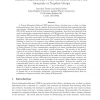340 search results - page 3 / 68 » Computationally Private Information Retrieval with Polylogar... |
114
click to vote
ISW
2010
Springer
14 years 9 months ago
2010
Springer
A Private Information Retrieval (PIR) protocol allows a database user, or client, to obtain information from a data- base in a manner that prevents the database from knowing which...
EUROCRYPT
2004
Springer
15 years 5 months ago
2004
Springer
We revisit the following open problem in information-theoretic cryptography: Does the communication complexity of unconditionally secure computation depend on the computational com...
ESORICS
2006
Springer
15 years 3 months ago
2006
Springer
Abstract. Many theoretical PIR (Private Information Retrieval) constructions have been proposed in the past years. Though information theoretically secure, most of them are impract...
93
Voted
SP
2007
IEEE
15 years 5 months ago
2007
IEEE
Since 1995, much work has been done creating protocols for private information retrieval (PIR). Many variants of the basic PIR model have been proposed, including such modificati...
ESORICS
2009
Springer
15 years 6 months ago
2009
Springer
Abstract. The ubiquity of smartphones and other location-aware handheld devices has resulted in a dramatic increase in popularity of locationbased services (LBS) tailored to user l...

